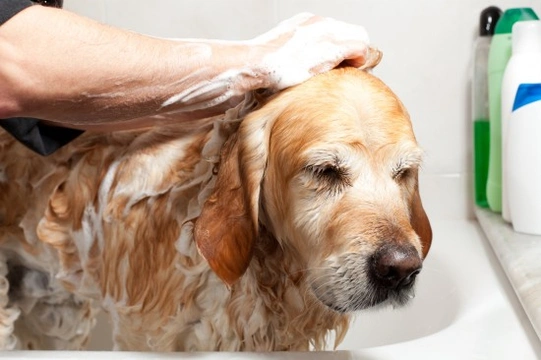
Help! My dog smells terrible!
Every animal, people included, have their own unique scents, although the not-so-sensitive noses of people often cannot determine the scent of a clean person, dog or other animal. However, the smell of “dog” is almost universally recognisable, particularly if it is very pronounced! While all dogs will have an aroma to them if you smell them up close, which can even prove to be comfortingly familiar to their owners, if your dog smells bad, or you can smell him from some distance away, or you find that the smell transfers onto your hand when you pat your dog, this requires addressing!
Some dogs are naturally cleaner than others, but as well as the natural canine body odour, some dogs seem to make a habit of going out of their way to get stinky, perhaps by rolling around in disgusting things when out on walks, or rooting about in the bin when given the chance. Added to this, some dogs produce a more musky sebum from their coats than others, which helps to protect them against the elements, but can contribute to a more pronouncedly doggy smell.
There are many additional reasons behind why a dog might smell particularly offensive, and identifying the reasons behind why your dog is a bit of a stinker can help you to tackle the problem and hopefully keep them smelling fresh! Read on for our advice.
Tooth and gum disease
If your dog’s teeth are rotting and in bad condition and if their gums are diseased and inflamed, this can lead to a particularly offensive breath odour from your dog. Added to this, when your dog licks their coat, the smell will transfer onto their fur, leading to a pervasive and often quite nasty odour surrounding your dog. It is not always obvious when the body of the dog smells that the source of the smell is the dog’s mouth, so it is important to take them for a veterinary dental check up and arrange for a dental procedure, if necessary.
Underlying illnesses
Some progressive illnesses such as diabetes can change the smell of your dog’s breath and the odour that they emit through their pores, and any change or inexplicable increase in the way that your dog smells should be investigated. A wide range of internal conditions, including kidney problems can lead to changes that affect the whole body including the way that your dog smells, so have them checked out by the vet if you suspect something is amiss.
Bacterial infections of the ears
Bacterial or fungal infections can produce a particularly noxious smell, and it is not always obvious to the owner that the problem originates in or is isolated to the ears. Mites, infections and dirty ears can all contribute to a bad smell, so have your dog checked out for any indications of ear problems as part of your investigations.
Anal gland problems
This is one of the most common causes of offensively smelly dogs, as the anal glands are designed to secrete a strong smelling oily substance that is particularly foul smelling to people. If your dog strains to go to the toilet or performs that odd “scooting” movement after a bowel movement, they may have impacted anal glands which will need to be expressed by a vet or professional dog groomer.
If your dog is particularly longhaired, you may find that oily secretions from the anal glands are being held within the hair of the back end, leading to a bad smell, so bathing your dog and possibly trimming the hair around the back end can help.
Allergy-related problems
Dogs that suffer from allergies, particularly food allergies, can suffer from an overproduction of skin oil or sebum, as a response to the allergenic trigger. This can cause an increase in the typical musty smell that dogs give off, as well as serving to irritate your dog’s skin. Getting to the root of the problem and finding out what is causing the allergic reaction is the best way to go about curing the condition.
Gassy dogs
While some dogs are simply generally more gassy than others, if your dog is always passing wind or passes particularly foul emissions from their back end, they may be suffering from a sensitivity to something in their food, or be suffering from digestive problems.
Changing their food may help with this, as can a vet check to be sure that there are no underlying problems leading to digestive discomfort.
Tips to keep your dog smelling fresh
- Try to keep your dog out of the bin and from rolling around in muck when out walking.
- Wash your dog’s bedding regularly.
- Groom your dog regularly.
- Bathe your dog or have them bathed by a professional dog groomer as needed.
- Do not over-bathe or bathe too frequently, as this can prove to be counterproductive.
- Clean up any dog smells in the house with an enzymatic cleaner that actually breaks down the biological root of the smell, rather than simply masking it.



